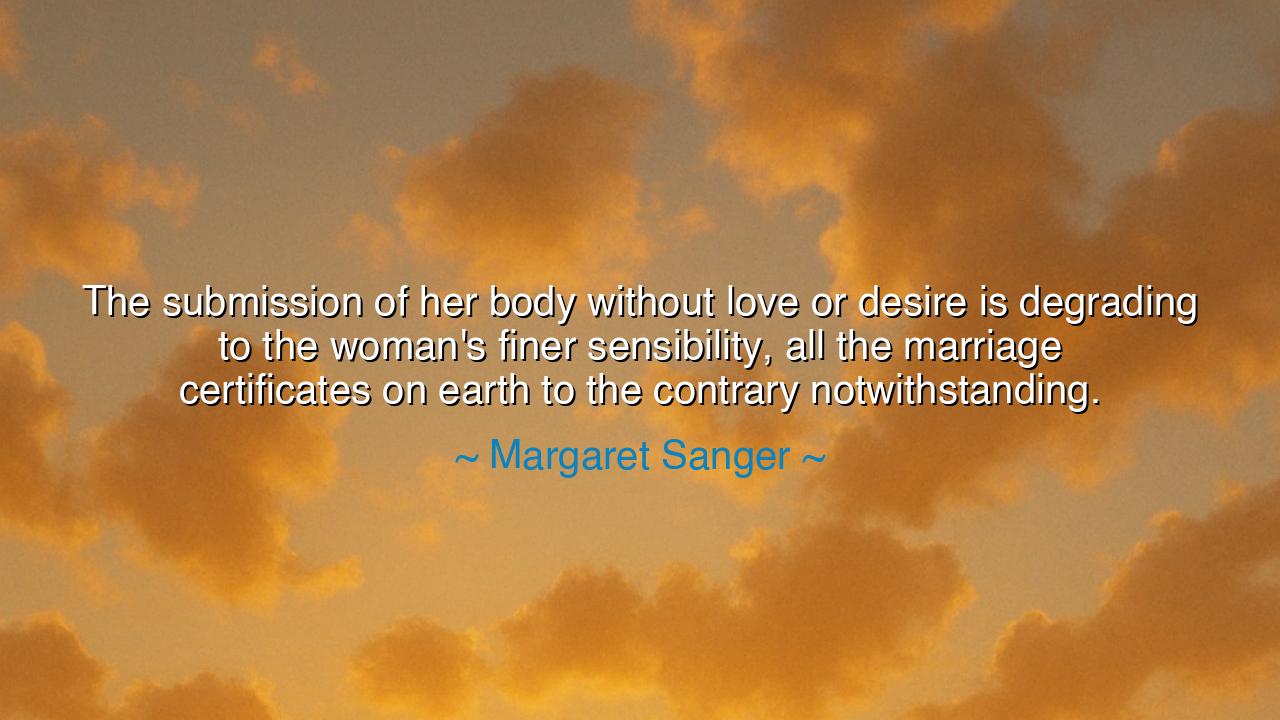
The submission of her body without love or desire is degrading to
The submission of her body without love or desire is degrading to the woman's finer sensibility, all the marriage certificates on earth to the contrary notwithstanding.






In the fierce and luminous words of Margaret Sanger, the revolutionary voice of women’s freedom, there burns a truth both tender and defiant: “The submission of her body without love or desire is degrading to the woman’s finer sensibility, all the marriage certificates on earth to the contrary notwithstanding.” These words, heavy with both compassion and rebellion, strike at the root of false sanctity—the idea that legal union alone can sanctify what is hollow, that a paper seal can make sacred what the soul rejects. Sanger, who lived in an age that bound women to silence and servitude, dared to declare that a woman’s body belongs to her spirit, not to law, not to custom, not even to her husband. Her words are both a cry for dignity and a hymn to love’s true sanctity—one that cannot be bought, commanded, or coerced.
The meaning of this quote flows from a simple yet radical truth: that love, to be pure, must be free. Sanger reminds us that the act of physical union without the presence of mutual desire or affection is not an expression of love but a violation of the soul’s integrity. When a woman gives her body without the consent of her heart, she is not elevated by duty but diminished by its emptiness. Her “finer sensibility,” that deep moral awareness born of compassion and spirit, recoils from such falseness. No law, no religious blessing, no marriage vow can transform submission without love into sanctity. For Sanger, the sacredness of union lies not in legality, but in authentic connection—in passion that arises from equality, not obligation.
The origin of these words is rooted in the fire of early twentieth-century struggle. Sanger spoke them as part of her broader crusade for women’s autonomy and reproductive freedom. In a world where wives were often denied control over their own bodies, where intimacy was demanded as a duty rather than offered as devotion, Sanger’s declaration was nothing less than heresy. But it was a heresy born of compassion. She had seen too many women broken by endless pregnancies, too many spirits crushed by loveless unions sanctified by law. Her life’s work—to give women knowledge of contraception and power over their own bodies—sprang from this conviction: that without freedom, love cannot breathe.
History gives flesh to her wisdom in the story of Nawal El Saadawi, the Egyptian physician and writer who, like Sanger, fought for women’s bodily autonomy in the face of oppression. El Saadawi risked her life and career to expose how culture and religion were used to enslave women under the guise of morality. She too spoke against forced submission, insisting that without consent and equality, no relationship can be righteous. Both women, separated by oceans and decades, echoed the same eternal truth: that the body is the temple of the soul, and to profane it with coercion is to desecrate the divine within.
Sanger’s insight is also a mirror held up to society’s hypocrisy. For centuries, the world exalted marriage as a sacred institution, even when it demanded that women bear children and suffer in silence. The law often sided with the husband, granting him authority over his wife’s body as though she were a possession, not a person. But Sanger’s words shatter this illusion. She teaches that true sanctity does not come from ritual or law but from mutual respect and desire freely given. Love cannot be mandated, and where it is absent, duty becomes degradation. Thus, she calls for a new morality—not one of control, but of consent; not of dominance, but of dignity.
Her words also carry a message for every age, including our own. In a world still struggling with the remnants of patriarchal thought, Sanger’s truth is a compass pointing toward wholeness. Whether in marriage, partnership, or any form of intimacy, the body must never be separated from the will, nor the act from the heart. When love is joined to respect, union becomes sacred; when it is joined to coercion, it becomes violence. The spirit of humanity itself depends on this understanding, for how we treat one another in love reflects how we honor life itself.
Therefore, O listener, take this lesson as both shield and light: let no law or custom compel you to call sacred what your soul knows is wrong. Let love, not duty, be the author of intimacy. Cherish freedom in your heart and in the hearts of those you love, for without freedom, there can be no tenderness. Teach your sons that affection is not ownership, and teach your daughters that consent is sacred. Build marriages not upon submission, but upon mutual joy and equality, for in such unions both souls are uplifted and the divine in each is revealed.
And so, remember the immortal wisdom of Margaret Sanger, who saw what many refused to see—that a woman’s worth is not measured by obedience, but by authenticity. The sanctity of love lies not in ceremony, but in the truth between two beings. When love is free, it ennobles both; when it is forced, it corrupts the sacred. May her words remind us always that dignity is love’s first law, and that no certificate on earth can make holy what the heart cannot bless.






AAdministratorAdministrator
Welcome, honored guests. Please leave a comment, we will respond soon